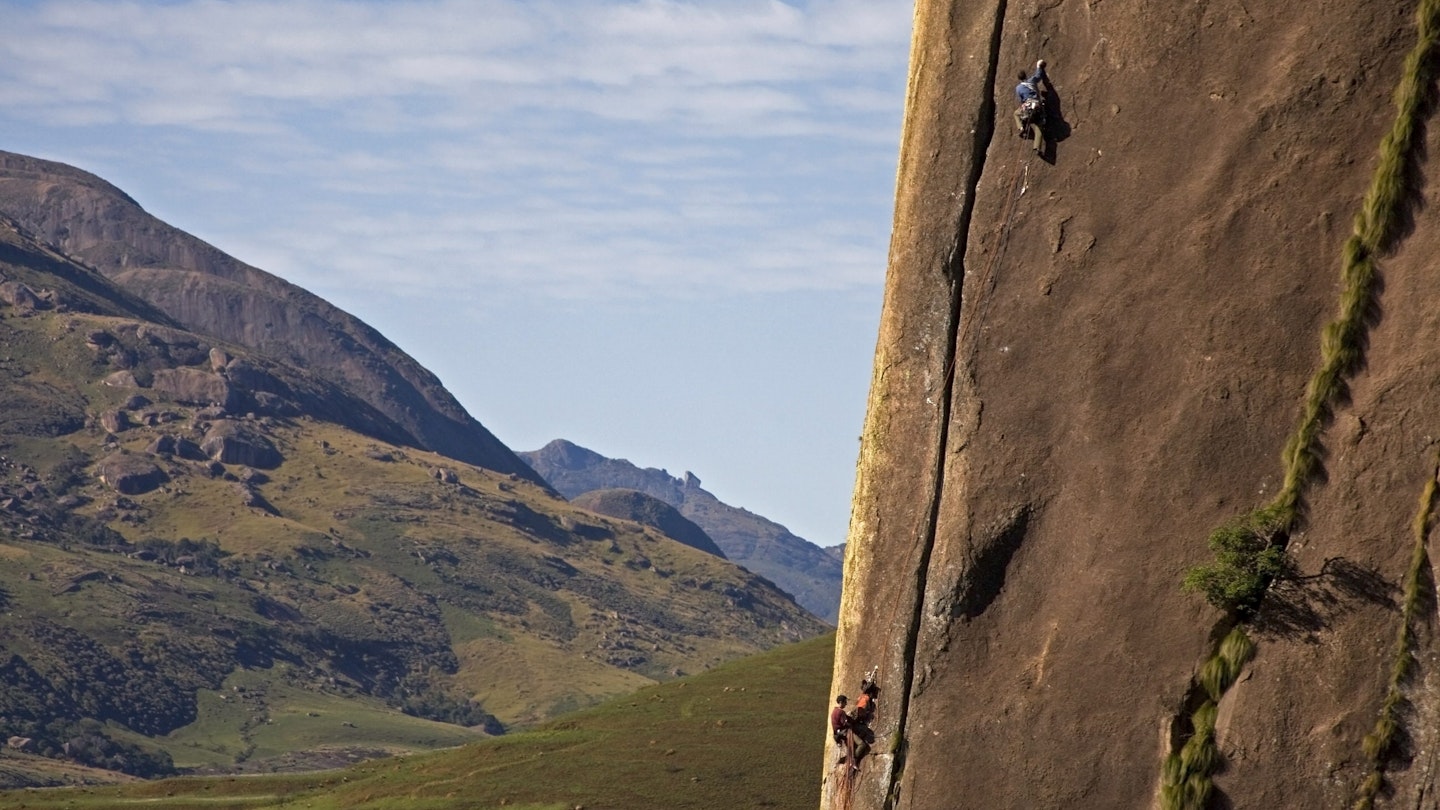You can blame DreamWorks and David Attenborough if all you know about Madagascar is that it’s the home of curious, charming lemurs and lithe-tongued, color-changing chameleons. The wildlife – and indeed the plant life – is incredible, with 90% of it endemic to this island where life has evolved in isolation since it separated from India around 88 million years ago; however, Madagascar is also an amazing adventure arena.
The national parks protect monumental landscapes: mountains stretching to nearly 3000m, tooth-like granite towers and mysterious cloud forests, mangrove swamps and primary jungle riven by rushing rivers, razor-sharp tsingy formations and deep limestone caves. The country’s 4828km coastline is no less promising – surfers rip up world-class waves, divers explore rich coral reefs, while kitesurfers and windsurfers harness some of the world’s most reliable trade winds.
Climbing
Rising above the tiny village of Andonaka in Parc National Andringitra is a series of dramatic granite faces up to 800m high and streaked in black, orange, and green. The big-wall face climbing of Tsaranoro – nearly all on bolts – is superlative, with routes up to 8c (the 10-pitch Mora Mora by Czech superstar Adam Ondra). The 14-pitch Out of Africa (7a) is considered by many to be the standout classic; moreover, there are more than 50 free routes to do, with potential for many more.

Hiking
Although it may have only one trail – the two- to three-day walk to Marojejy Peak (2132m) – the World Heritage-listed Parc National de Marojejy leads walkers through evergreen rainforest to misty montane cloud forest and low alpine tundra. Bird enthusiasts can spot up to 118 species, while the park has 11 species of lemur, including the beguiling (but critically endangered) silky sifaka.
To the south of Marojejy, on the Masoala Peninsula, there are more options, from short day walks to the grueling seven-day trek from Maroantsetra to Cap Est. Once again, the wildlife-spotting opportunities are off the scale; there are 10 species of lemur, including the extremely handsome red ruffed variety, in addition to numerous delightful geckos, colorful chameleons, and the exceedingly toxic tomato frog.

Other highlights include Parc National Bemaraha with its bizarre 200m-thick plate of ancient, surreally eroded, and razor-sharp coral, known in the Malagasy tongue as tsingy, which can be roughly translated as ‘surface that cannot be walked upon’. The granite spires of Parc National Andringitra also stand out, particularly for plant lovers, who can try to identify more than a thousand species.

Surfing
Warm Indian Ocean swells rolling up the Mozambique Channel create outstanding surf on the southwestern corner of Madagascar, particularly around the village of Anakao, where there are least 18 breaks, 12 of which are world-class (most accessible only by boat). Surfers can find waves on all four corners of the island; consequently, its remoteness and reputation for sharks (apparently exaggerated) have kept the crowds away, meaning there’s no one to drop in on your wave.

Kitesurfing & windsurfing
Stroked by a powerful trade wind locals dub the ‘Varatraz’, northern Madagascar, particularly around Diego Suarez, is perfect for kitesurfers and windsurfers, who’ll have the waters of the aptly named Emerald Sea all to themselves. Visitors can find excellent accommodations and gear rental options in the area.

Diving & snorkelling
Beneath the waves, the wildlife is almost as exciting as on land. Off the southwest coast, you’ll find the world’s third-largest coral reef system, Tuléar, with 6000 recorded species including everything from prehistoric coelacanth fish to turtles and whale sharks. Further north, the island of Nosy Be and its archipelago also offer exceptional diving. The period from May to December offers the best visibility (up to 30m).

Paddling
Pirogues are a traditional part of Madagascan life, and canoe trips are a perfect way to absorb local culture and spot wildlife. Taking two to four days to paddle, the Tsiribihina and Manambolo rivers are among Madagascar’s most popular river journeys, although the former has been affected by security issues of late. Kayakers and rafters can also find more technical rivers such as the Manankazo and Mazy; moreover, sea kayaking off the east coast is superb, particularly around the Masoala Peninsula and around the Sainte Luce Reserve in the south.





